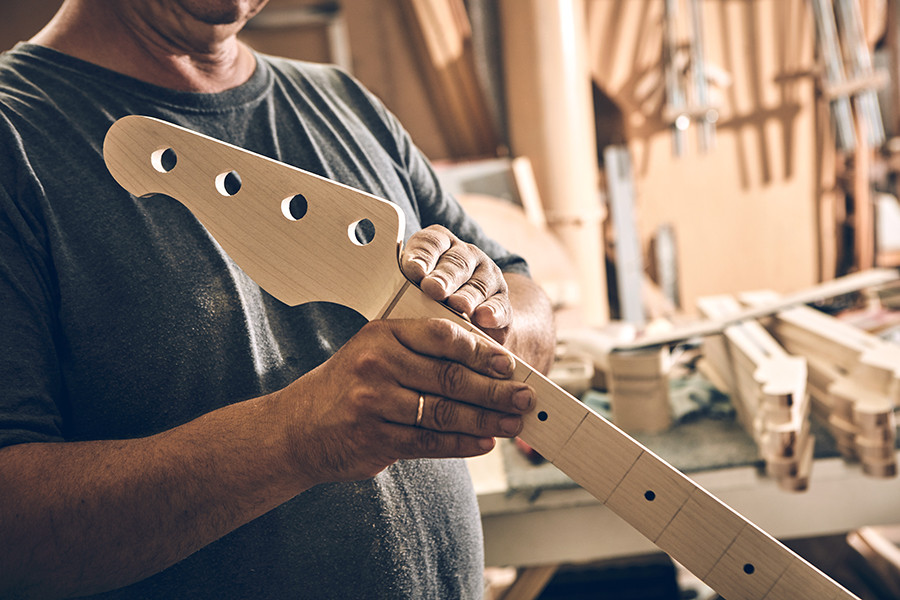A Guitar Luthier is more than just someone who fixes guitars; they are highly skilled artisans who build, repair, and restore guitars and other stringed instruments. Like many fulfilling careers rooted in music and craftsmanship, becoming a guitar luthier requires dedication and time to hone your skills. However, for individuals with a creative spark, a keen eye for detail, and a love for working with their hands, the path of a guitar luthier can be incredibly rewarding. Let’s explore the intricate world of the guitar luthier and what it takes to join their ranks.
What Exactly Does a Guitar Luthier Do?
The term “luthier” itself broadly refers to a craftsperson who specializes in making and repairing stringed instruments. While some luthiers may work with a variety of instruments, a guitar luthier focuses specifically on the guitar, mastering its unique construction and nuances. These professionals dedicate themselves to the art of guitar repair and construction, often specializing in specific types of guitars like acoustic, electric, or classical instruments. Guitar luthiers can be found in various work environments, from large guitar factories producing instruments on a larger scale to smaller, dedicated guitar repair shops, and even as self-employed artisans running their own businesses.
The work of a guitar luthier is diverse and demanding. Beyond the creation of new instruments, a significant portion of their work involves repairing and restoring guitars that have suffered damage. This can range from addressing minor cosmetic issues like dents and scratches to tackling significant structural damage like cracks and fractures in the guitar’s body or neck. Luthiers are adept at cleaning, sealing, patching, and refinishing damaged areas, meticulously working to restore the instrument to its former glory, often making repairs virtually undetectable. Furthermore, they play a crucial role in bringing neglected instruments back to life, ensuring guitars that have been stored away for extended periods are once again in optimal playing condition.
While formal apprenticeships are a common route for aspiring guitar luthiers to learn and refine their skillset, many successful luthiers enter the field with a foundation of complementary skills and experiences. Certain aptitudes and knowledge bases naturally lend themselves to this intricate craft:
 Request Info
Request Info
- Comprehensive Knowledge of Guitar Design and Repair: A deep understanding of guitar anatomy, construction techniques, and common repair procedures is fundamental.
- Proficiency in Woodworking and Finishing Techniques: Guitar making is inherently a woodworking craft, requiring expertise in shaping, joining, and finishing wood.
- Exceptional Acoustic Listening Skills: The ability to discern subtle nuances in sound is crucial for evaluating and optimizing the tonal qualities of a guitar.
- Strong Interpersonal and Communication Skills: Whether interacting with clients, suppliers, or colleagues, clear and effective communication is essential.
- Business Acumen: For those running their own repair shops or custom luthier businesses, understanding business operations is vital for success.
Interestingly, many guitar luthiers are also guitar players themselves. While virtuoso-level playing ability isn’t a prerequisite, a working knowledge of how to play the guitar provides luthiers with invaluable insight into how an instrument is used and how design choices impact playability and performance. A solid grasp of basic guitar techniques like strumming, tuning, and fundamental playing methods is highly beneficial for anyone aspiring to become a guitar luthier.
 Los Angeles Guitar Luthier School
Los Angeles Guitar Luthier School
Charting Your Course: How to Become a Guitar Luthier
There isn’t a single, prescribed path to becoming a guitar luthier, but several effective routes can lead to a successful career in this craft. The first step for any aspiring luthier is to obtain a high school diploma or equivalent. A solid foundational education is particularly beneficial if you plan to pursue formal training at a guitar luthier school or vocational program.
Self-Guided Learning: The Independent Path
Many established luthiers began their journey by independently exploring the fundamentals of guitar making and repair. A wealth of resources is readily available online, offering insights into instrument materials, basic guitar design principles, and repair techniques. Even if you later decide to pursue formal training, self-education provides a valuable initial grounding in the craft.
A crucial starting point for self-learners is understanding the diverse types of wood used in guitar construction and how each species influences an instrument’s sound and structural integrity. Thorough research into the anatomy of a guitar, its various components, and common repair issues is also essential.
Gaining hands-on experience early on is highly recommended to determine if a career as a guitar luthier truly resonates with you, especially before committing significant time and resources. Working with guitar making kits or practicing repairs on inexpensive guitars can provide valuable practical experience and help you assess your aptitude and enjoyment of the craft. Modifying instruments and undertaking basic repair tasks offers a tangible way to test the waters before pursuing formal education or an apprenticeship.
It’s important to acknowledge that self-teaching the intricate skills of a guitar luthier demands considerable dedication, self-discipline, and perseverance. Furthermore, learning in isolation lacks the invaluable mentorship and guidance of an experienced professional luthier. If structured learning environments are more conducive to your learning style, consider exploring workshops or online classes as a stepping stone before committing to more extensive schooling or an apprenticeship.
 Luthier School Electric Guitars
Luthier School Electric Guitars
Formal Education: Structured Skill Development
Formal education offers a structured and comprehensive approach to acquiring the skills necessary to become a guitar luthier. Various vocational training programs are available, focusing on guitar repair and building, musical instrument repair technology, and luthier fundamentals. These certificate or diploma programs typically range from one to two years in duration and provide foundational training to launch your career.
For more specialized and intensive training, numerous programs and workshops across the country concentrate on specific facets of instrument design and repair. Even if your primary focus is guitars, broadening your skills by taking courses in the repair and construction of other stringed instruments can enhance your versatility and marketability as a professional.
Additionally, relevant classes and workshops, such as woodworking courses or instrument repair workshops, can provide valuable hands-on learning experiences under the guidance of experienced professionals, supplementing your core luthier skills. Any opportunity to learn practical techniques from seasoned craftspeople will significantly benefit your development as a luthier.
Apprenticeship: Learning from a Master
For many aspiring guitar luthiers, pursuing an apprenticeship under a seasoned professional is an invaluable step. Apprenticeships provide the opportunity to learn advanced techniques and gain practical, on-the-job training in a real-world setting. Building relationships with established luthiers in the field is crucial for gaining insights into the profession, acquiring practical experience, and opening doors to future employment opportunities.
The ideal apprenticeship setting often depends on your long-term career aspirations. If your goal is to work in a guitar factory setting, seeking an apprenticeship that provides experience in factory production environments would be advantageous. Conversely, if you envision yourself running your own guitar repair shop, apprenticing or securing an entry-level position in a reputable repair shop would be a more strategic starting point.
A Rewarding Path for Passionate Craftspeople
Becoming a guitar luthier is a journey that demands dedication, skill, and a genuine passion for the craft. However, for those who are drawn to the intricate world of guitars and possess a desire to create and restore these instruments, it offers a deeply rewarding and fulfilling career path. Whether you choose self-education, formal training, or apprenticeship, the pursuit of becoming a guitar luthier is an investment in a lifelong passion and a testament to the enduring appeal of handcrafted musical instruments.
